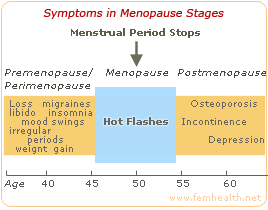As many women enter their middle age years into menopause they undergo various stages of it. The most regular are hot flashes, night sweats, incontinence and vaginal dryness. It usually begins with hot flashes while they are still menstruating until their mid-forties.
There a range of treatments offered both traditional and alternative to relieve these problems as women go through these hard life stages.
Traditional Treatments for the Stages of Menopause

Most women going through the first stages of peri-menopause and menopause usually choose hormone replacement therapies. In turn there are various therapy treatments that can be created for each woman, as no woman undergoes the menopause stages the same way as the other. Each woman's problems differ and the extent to which they undergo the menopausal stage. It is therefore best to always ask one's doctor of what dosage and what type of medication is best for you.
HOT FLASHES: For women going through series of hot flashes, it is usually advised they use less amounts of hormone replacement therapy (HRT) at various stages, as hot flashes are usually temporary and go away soon after the last stage of menopause. Hot flashes are usually a short term problem between the peri-menopausal and final menopausal stages and don't generally need high levels of hormone replacement treatments.
MOOD SWINGS: Mood swings are also shown to be related to a woman's menopausal stages as her body undergoes through a variety of unstable fluctuations on all levels. Yet, there is no hard proof relating menopause as an outcome for unstable behavior and mood swings. Mood swings can be caused by various other circumstances during menopause such as the biological toll the body undergoes in these stages and the feelings having to be dealt with so unpredictably. Other motives include the cultural constructions regarding the women's life menopause stages and can have an affect on her psychological state.
INCONTINENCE: Women going through any form of incontinence during the menopause should be aware of hormone replacement therapies as it has shown to worsen this symptom. At the same time the oestrogen has shown to lessen the risk of urinary tract infections.
Also noted is that women who still have their uterus during the menopause stages must not take treatments with progesterone treatments.
OSTEOPOROSIS: There is no evidence joining menopause as a cause to bone density or starting osteoporosis in women.
Although strong evidence has shown that hormone treatment minimizes the chance of low bone density happening in women, and has shown to keep density over time. Osteoporosis treatment in particular is not recommended for women going through the symptoms of the life menopause stages.
Bisphosphonates are advised instead, which are high in calcium and vitamin D compounds for first time patients wanting to treat bone density problems especially in the phase of menopause.
LOSS OF LIBIDO: Lack of libido is said to be a usual symptom amongst women in their menopause stages. Research conducted has shown menopause does not link to being a reason to low libido and is often initiated by mental problems instead.
Testosterone is given in HRT particularly for women who have had a hysterectomy as well in various doses in HRT for women going undergoing menopause and who have had a hysterectomy. Many countries do not give out testosterone in HRT. Testosterone is shown to heighten women's libido, but consult with your doctor to see about giving it as a treatment.
Alternative Treatments for the Stages of Menopause
There have proven to be various relief symptoms of the menopause problems without the utilization of HRT and prescribed clinical treatments. These include:
- Acupuncture
- Herbal medicines and treatments
- Exercise
- Psychological therapy
- Healthy dieting
- Social and creative activities
Indulging in alternative medicines such as herbal treatments and mineral solutions does not particularly mean it is safe for everyone. The compound structure and properties of lots of herbs also affect one's hormone and body functioning just as medications made from laboratories. Herbs and minerals can have just as much withdrawals as any medicinal compounds that are created in laboratories.
It is advisable to ask a professional practitioner or herbalist to advise the correct herbal treatments for you and the best way to take the treatments during the different menopause stages.
Conclusions
To date there have been so many advancements in the research of menopause and the causes of it and solutions to these symptoms. It is evident that solutions will differ from each individual but it all comes down to what feels right for you.
